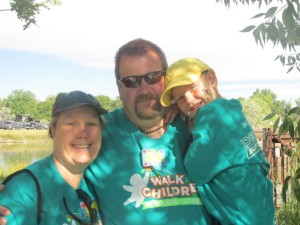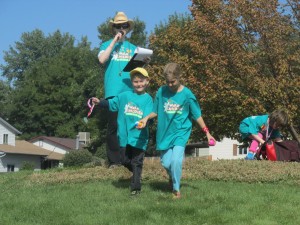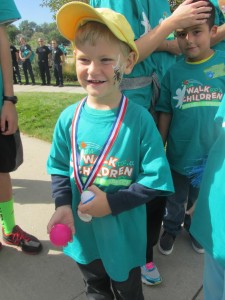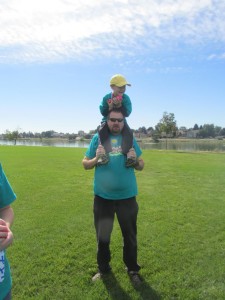Walker Spotlight: Why I walk for CASANA, by Monica Mayhak
Our story is much like many other families’ stories. A relatively quiet baby, the missing “mama” and “dada,” the doubt creeping in. For us, it was easy to know that something was off. Our little Emmett is the youngest of six. We knew how this all worked and something wasn’t working here. After five typical and healthy children, when Emmett was 18 months old we had our first experience of asking our pediatrician if something might be wrong. Looking back, I realized I felt embarrassed—was I overreacting? I didn’t want to bother her with this if it was just that he was a bit different from our other children.
But she was concerned too and referred us to early intervention services. I remember going for Emmett’s evaluation. We walked in, just Emmett and me, to what felt like a roomful of people. It was only about three evaluators, but it scared me. They played with Emmett one-on-one, having him try to go down a slide, stack blocks, do pretend play. As I watched, it slowly dawned on me that he couldn’t do any of these things. When one of them looked at me and asked, “Does he always drool this much?” my heart sank. Why yes, he does, and that is concerning me too. They didn’t give me any answers then, but when I got in the car and called my husband, I told him, something is really wrong here. I think really, really wrong.
But I didn’t know what. Emmett qualified for services, so a speech therapist came to our home one day a week. This was supplemented with some meetings with an OT. Then, because Emmett couldn’t get through a therapy session without shutting down or hitting or just doing his own freaky things, they called in a DI. “What is a DI?” I asked. A developmental interventionist. Hmmm, what is that? We were told they used to be called “behavioral therapists.” Great I guess. She’ll help us, but what is going on? No one could tell us.
So I did what probably every other confused mother does—turned to Google. I typed “2 year old can’t talk.” And boom—got lots of hits. Ok, not as helpful as I thought. Lots of ideas to encourage kids to talk and lots of reassurances that it all gets better on its own. Hmmm…ok, let’s try “3 year old can’t talk.” And again, boom—lots of links. But this time, they start referring to the possibility of autism. Emmett doesn’t have autism, so this wasn’t making sense to me either. Keep digging, going up in age, and deeper into links and I ran into my first encounter with apraxia.
This was also my first encounter with CASANA. I read and read and read and read. And cried and cried and cried, because this was describing my son. At our next speech therapy session, I asked the SLP about it. She said, “I’m not really familiar with that and it isn’t diagnosed until they are older.” And that was that. For her. But not for me. Back to the internet and reading more and more.
And then, God mercifully gave us hope. In looking around I found that CASANA was putting on a small workshop here in Denver. Perfect! I’ll go to that! Looking back now, I realize how extraordinarily blessed we were to have this all line up like this. I could have easily missed this workshop, it could have easily not been scheduled here in Denver, I could have easily thought it wasn’t worth it. Sharon Gretz was the presenter. Didn’t know anything about her, but like many families with a child with CAS, I do know her now. And she is our hero!
I attended the small workshop, absorbed everything, and then cried all the way home. Sobbed really. I went home to my husband and told him “we are doing everything wrong!” I realized that we had not been addressing his needs correctly because we simply did not know how. But this moment of despair disappeared quickly, and I realized that I had found something else besides information at that workshop. It was hope.
But that fear that I felt when I first took Emmett to be evaluated got big and ugly. I was so very, very afraid. I told my husband, “I can’t do this.” He is a rock and said to me, “You are going to do this. We are going to do this. This is what God is asking us to do. He gave us Emmett…how can we say no?”
So now we knew. But what to do from here? We found a private SLP who understood apraxia. She helped us to understand and started to work with Emmett. For a couple of years we worked with her and made some progress. Emmett’s behavioral issues constantly got in the way, but she was able to help him with that and help us understand. It was eye opening to see how I could help Emmett.
And I began devouring everything I could find about CAS. I turned to CASANA’s resources more and more. And then another miracle! I learned that the national conference was to be held in Denver—it felt like my own private miracle, that God worked it so that I could go! I could never have attended it without it being in my own backyard.
It may sound melodramatic, but that conference changed our lives. My mother had passed away a few short weeks before, and because I had spent six weeks caring for her in my home, Emmett’s needs got lost in the shuffle. That conference was an incredible boost for us, a new beginning in a way. I was exhausted at the end of those days—my brain trying to keep everything. Exhausted!
And it was like meeting rock stars! David Hammer! Ruth Stoeckel! Dee Fish! Nancy Kaufman! (I sat down at her session and thought, “I HAVE HER CARDS!!!” That is how geeked out I was.) I absorbed everything. And learned and learned and learned. So I left there with information, motivation, ideas, and most of all hope.
I discovered CASANA’s webinars. Fantastic! It is like being able to have those conference sessions in your own home. I have attended many of them and besides learning more and more, they became important periodic motivators for me. They are a reminder that I need to keep building knowledge and keep fighting every day for him. It is so, so easy to get discouraged–these webinars are great helps for my heart. The webinar presenters are familiar faces from the conference. It is like having a friend, who really cares about my child and my family, sit down with me to give me new information and some needed encouragement. 
We then threw our hat in the ring to see if we could qualify for an iPad for Emmett through CASANA’s iPad for Apraxia Project. Our SLP helped us with the application and we did qualify! Emmett’s iPad is just his. He doesn’t share it with anyone else and it is loaded with speech apps and learning games. The ease of using the Ipad with Emmett gave us a new way to help him, and that now familiar dose of hope that only CASANA could provide us.
It was after that we had a change in health insurance and thought that for the first time, we had a shot at getting coverage for Emmett’s treatment. While we were sad to leave our SLP, I realized what an opportunity this was for us. I looked around, and in doing so ran across mention of CASANA’s bootcamp attendees. I wondered if there was anyone from our area who had attended. I can’t remember how I stumbled across it, but I saw mention that Laura Smith from the Denver area was in the current class. Score! I then found out that she was working at a clinic that could help us with insurance. Score again! Our insurance didn’t change until October, so I began to see if I could make this work. To be honest, I began stalking Laura a bit on the internet—even found her picture!
So, as you can imagine, when I saw her at the Denver Walk for Apraxia, I had to talk to her! I don’t know if she remembers, but I probably came across as a crazy person. I went up to her and I think I said something like, “Are you Laura Smith? I’ve been stalking you on the internet!” Great start! But thankfully I did not scare her off. I began to tell her about us and she patiently listened and then gave me her contact information. She gently told me she had to go be with her kids, and I then realized that I was keeping her hostage. She walked off and I felt like I had won the lottery!
We were able to get scheduled with her and begin therapy the next week. I learned that she had a little girl the same age as Emmett with CAS. I watched her work with him that first time. I soaked in her gentle reassurances to me. I got in the car at the end of the session and cried and cried. She is just perfect for Emmett and just perfect for me. What CASANA gave to Laura through support and the bootcamp was trickling down to me. Laura, just like CASANA, gives me the tools and information and support I need to help Emmett. But more than that, we have been given hope!
I started this out by saying that our family’s story is much like that of other families who have a child with CAS. But I know that our ending is not the same as many. At the conference in Denver, there was a final question and answer session. I chose to go the one offered for parents new to a CAS diagnosis with younger children. In the middle of the session, a mother approached the microphone with her question. She said that she was overwhelmed with information, but had a specific question for the panel. Her son was 15 and had just finally been diagnosed with apraxia. He had floundered in the school system and never had appropriate treatment. She asked, “Is there hope for him now?”
The panel was gracious and so helpful, but I think everyone there felt a knot in their stomachs and knew how serious and devastating that situation was. When treatment is started early, yes, there is hope. For a child that age, it is difficult. The SLPs on the panel spent a good amount of time talking with her and did their best to help her.
And again at a more recent visit by Sharon Gretz to Denver for another workshop, there was a mother who asked about how to help her nine year old son who had not received appropriate treatment. She said he was resisting all her efforts. She also asked, “Is it too late? Is there hope for him?”
I think of those women often. That could have been me in a few years, confused and despairing. But we are not in that place. CASANA has provided a lifeline for our family. They offer workshops and the conference and webinars and more. They fund research and educate the world about this disorder. They provided the training that Laura uses to help Emmett. They helped us to see that we are not alone. But the most important thing they give to all of us is hope. And truly it is only with that hope that we can continue this fight and do this work with and for our kids.



